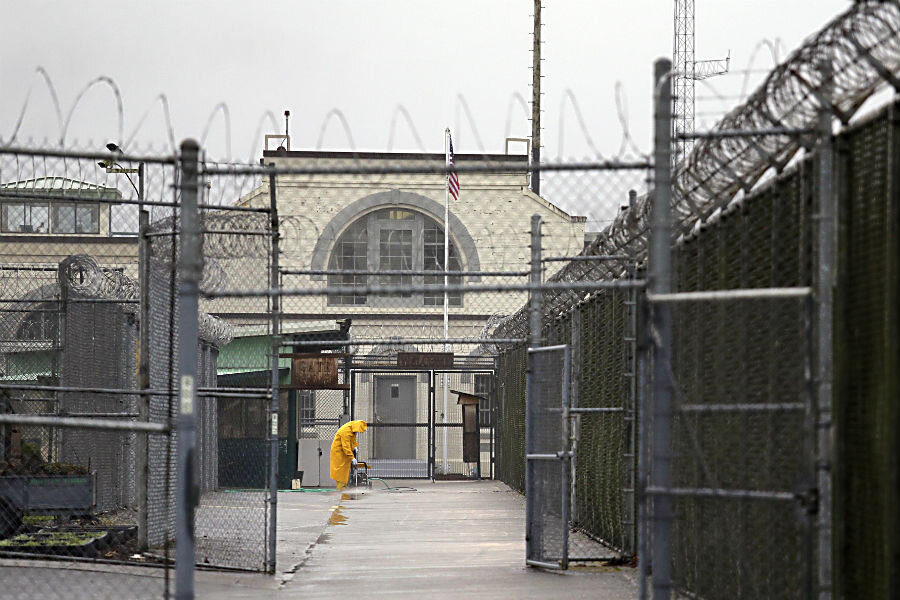Parents in prison: How to help US children?
Loading...
A new report, "A Shared Sentence," shows that millions of children in the United States have lived without one or both of their parents due to incarceration in recent years.
The policy report by The Annie E. Casey Foundation listed a "conservative estimate" that 5.1 million children nationwide, or seven percent, had a parent behind bars at some point in their lives. That figure only includes children whose parents lived with them at some point.
"As the US prison population surged during the past several decades, so too did the number of children and families experiencing the consequences of having a loved one incarcerated," the report states. "Children need stability and support to minimize the impact of incarceration on their lives, which requires families and communities equipped to properly care for them, as well as parents prepared to provide for them and contribute to their communities upon release."
Every state has thousands of children who have had to deal with parents' time in prison or jail. The numbers vary widely across the country: In New Jersey, just 3 percent of children have parents in prison. In Kentucky, it's 13 percent, the highest in the nation. In eight states, 10 or more percent of children had parents locked up.
"Without a doubt, people who break the law should face the consequences. Still, parents who are incarcerated do not live in isolation: They are fathers, mothers, partners, caregivers, breadwinners and community members, and their kids inevitably end up sharing their sentences," the report says.
The Casey Foundation also found that the prevalence of incarcerated parents appears to be increasing. Between 1991 and 2007, the number of children with a father in prison or jail rose by more than 50 percent, while the number with imprisoned mothers grew by more than 100 percent.
Since 1980, the overall federal incarceration rate has shot up by 721 percent since 1980, and by 240 percent at a state level, according to a 2011 report from Human Rights Watch.
Aside from financial and legal issues resulting from parents in prison, children growing up in such homes can face mental and emotional challenges as well.
"Having an incarcerated parent past or present is a traumatic experience that can lead to increased poverty, stress and unstable environments, affecting kids’ health and academic performance," Alicia Guevara Warren, the Kids Count policy director at the Michigan League for Public Policy, told The Detroit News. Michigan is home to the fifth-highest total of children whose parents were locked up, tied with six other states with 10 percent of parents in prison.
Programs at prisons, community centers, and schools can all help mitigate those effects, however, starting as soon as families learn that a loved one may be headed to prison.
In many cases, parents are arrested without warning, giving their children and community little time to plan for the future. Several points on the San Francisco Children of Incarcerated Parents Partnership (SFCIPP) Bill of Rights – a listing of needs for children dealing with the incarceration of a parent – relate to the period immediately following an arrest, and helping children cope with the sudden absence in their everyday life.
Ongoing contact between parent and child is also essential to maintaining relationships, according to the Bill of Rights – and not only within the family itself. The Casey report noted that keeping children in contact with their parents is also helpful to society as a whole, by improving a child's well-being and decreasing a parent's likelihood of becoming a repeat offender.
So far, however, few programs exist to support those relationships. The Foundation applauds states that prioritize family considerations, such as New York's Osborne Association FamilyWorks program, which outfits eight of the state's prisons with child-friendly visitation rooms. The Michigan Department of Corrections' "Staying in Close Touch" initiative allows parents to keep up connections with their children by having them record their reading of a book, while the National Fatherhood Initiative InsideOut Dad project, currently in use in about 25 states, allows imprisoned fathers to improve their parenting while in prison.
Ongoing support for children and parents is required after release, as well. For example, "ban-the-box" rules now in place in several states delay employers' questions regarding an applicant's criminal history until further along in the hiring process, making it more likely for previously incarcerated mothers and fathers to get a new job to provide for their families.








